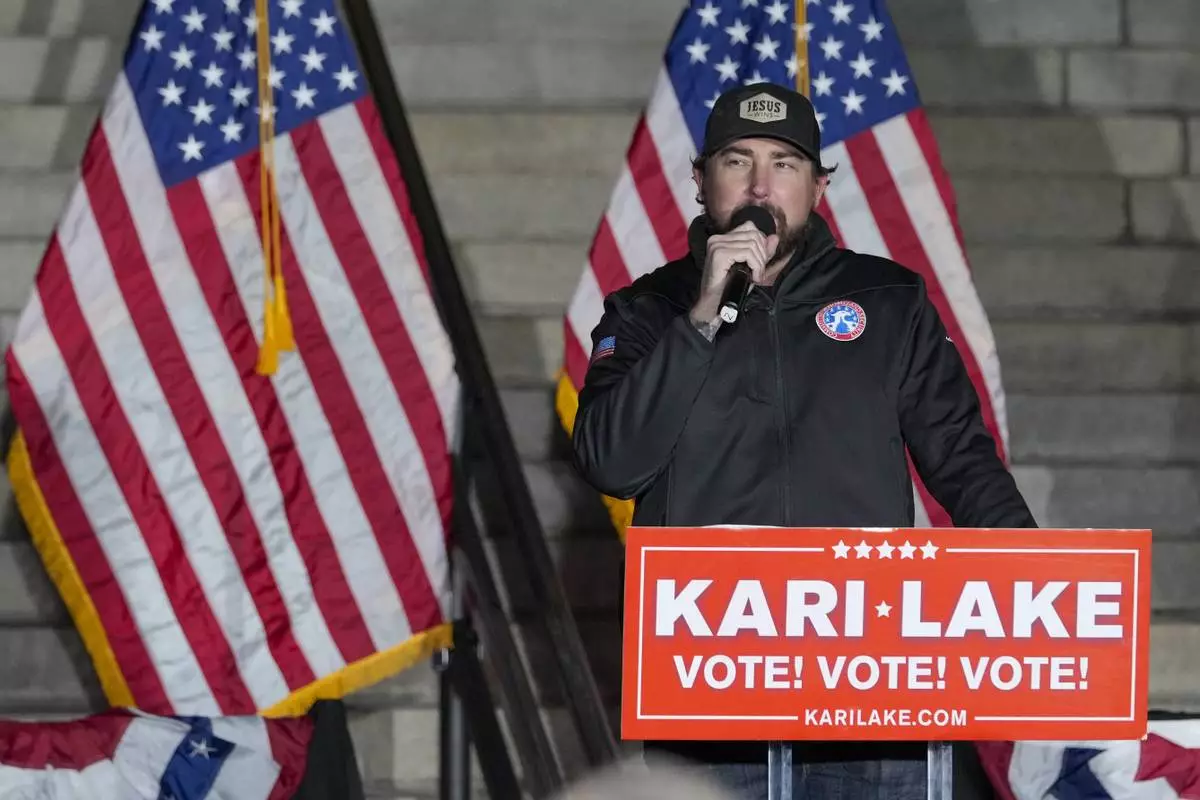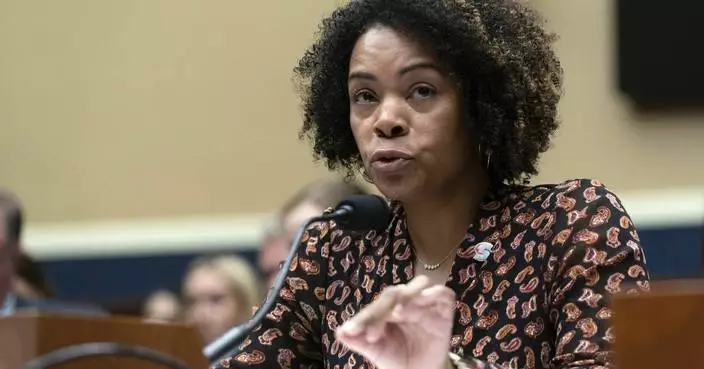PHOENIX (AP) — Republican U.S. Rep. Eli Crane won reelection in a Republican-leaning congressional district covering vast swaths of rural Arizona.
Crane faced a spirited challenge from Democrat Jonathan Nez, the former Navajo Nation president, in the 2nd District race. Nez was vying to become the first Native American to represent Arizona in Congress.
In a statement late Saturday, Crane commended Nez for entering the race and thanked voters.
"I will continue using every tool in my arsenal to fight against the corruption and selfish interests of the DC elites to put rural Arizonans FIRST,” Crane wrote. “I'm laser-focused on working with President Trump to lower inflation, secure the border and return to peace through strength.”
The district covers much of northeastern Arizona and dips south to the northern Tucson suburbs. It includes 14 of the 22 federally recognized tribes within the state.
Nez said in a statement late Saturday that he called Crane to congratulate him on a hard-fought victory.
“Although we didn’t get the outcome we hoped for, the work we began together is not over,” Nez wrote.
Crane, a former Navy SEAL who served in the military for 13 years, is a member of the far-right House Freedom Caucus and a staunch ally of President-elect Donald Trump, who won Arizona. Crane was among eight U.S. House Republicans nationally who voted to oust Rep. Kevin McCarthy as House speaker in 2023.
Crane focused on securing the U.S.-Mexico border and supporting military veterans. In 2022, he unseated three-term Democratic Rep. Tom O’Halleran after the rural district was redrawn to become significantly more conservative.
Nez campaigned largely on securing water rights and fulfilling the needs of rural residents. Nez was the Navajo president from 2019 to 2023 but lost his reelection bid. He also served as the tribe's vice president, a Navajo County supervisor and a Navajo Nation Council delegate.
Three other U.S. House races in Arizona were too early to call Saturday, most notably the 1st and 6th Congressional Districts.
Republican David Schweikert is seeking an eighth term in the affluent 1st Congressional District that includes north Phoenix, Scottsdale, Fountain Hills and Paradise Valley. His challenger is Democratic former state Rep. Amish Shah.
The 6th Congressional District race pits Republican Rep. Juan Ciscomani against Democrat Kirsten Engel, whom he narrowly beat two years ago. The district runs from Tucson east to the New Mexico state line and includes a stretch of the Arizona-Mexico border.
The U.S. Senate race in Arizona between Democratic Rep. Ruben Gallego, an Iraq War veteran, and Republican Kari Lake, a well-known former television news anchor and staunch Trump ally, also remained too early to call Saturday.

Arizona 2nd Congressional District Republican Rep. Eli Crane speaks during a campaign rally for Republican Arizona U.S. Senate candidate Kari Lake, Monday, Nov. 4, 2024, in Prescott, Ariz. (AP Photo/Julio Cortez)

Arizona 2nd Congressional District Republican Rep. Eli Crane waves to supporters as he is introduced by Republican presidential nominee former President Donald Trump at a campaign rally Sunday, Oct. 13, 2024, in Prescott Valley, Ariz. (AP Photo/Ross D. Franklin)
DEIR AL-BALAH, Gaza Strip (AP) — Houthi rebels in Yemen said Israeli airstrikes on Thursday targeted the rebel-held capital of Sanaa and the port city of Hodeida, following several days of Houthi launches setting off sirens in Israel.
The Israeli military said it attacked infrastructure used by the Houthis at the international airport in Sanaa and ports at Hodeida, Al-Salif and Ras Qantib along with power stations. It came a day after Israeli Prime Minister Benjamin Netanyahu said that “the Houthis, too, will learn what Hamas and Hezbollah and Assad’s regime and others learned.”
Netanyahu monitored the new strikes along with military leaders, his government said. The Iran-backed Houthis' media outlet confirmed the strikes in a Telegram post but gave no immediate details. The U.S. military also has targeted the Houthis in Yemen in recent days. The United Nations has noted that the ports are important entryways for humanitarian aid.
Over the weekend, 16 people were wounded when a Houthi missile hit a playground in Tel Aviv. Last week, Israeli jets struck Sanaa and Hodeida, killing nine people, calling it a response to previous Houthi attacks. The Houthis also have been targeting shipping on the Red Sea corridor, calling it solidarity with Palestinians in Gaza.
Meanwhile, an Israeli strike killed five Palestinian journalists outside a hospital in the Gaza Strip overnight, the territory's Health Ministry said. The Israeli military said that all were militants posing as reporters.
The strike hit a car outside Al-Awda Hospital in the built-up Nuseirat refugee camp in central Gaza. The journalists were working for the local news outlet Al-Quds Today, a television channel affiliated with the Islamic Jihad militant group.
Islamic Jihad is a smaller and more extreme ally of Hamas and took part in the Oct. 7, 2023 attack in southern Israel, which ignited the war. The Israeli military identified four of the men as combat propagandists and said that intelligence, including a list of Islamic Jihad operatives found by soldiers in Gaza, had confirmed that all five were affiliated with the group.
Hamas, Islamic Jihad and other Palestinian militant groups operate political, media and charitable operations in addition to their armed wings.
Associated Press footage showed the incinerated shell of a van, with press markings visible on the back doors. Sobbing young men attended the funeral outside the hospital. The bodies were wrapped in shrouds, with blue press vests draped over them.
The Committee to Protect Journalists says that more than 130 Palestinian reporters have been killed since the start of the war. Israel hasn't allowed foreign reporters to enter Gaza except on military embeds.
Israel has banned the pan-Arab Al Jazeera network and accused six of its Gaza reporters of being militants. The Qatar-based broadcaster denies the allegations and accuses Israel of trying to silence its war coverage, which has focused heavily on civilian casualties from Israeli military operations.
Separately, Israel's military said that a 35-year-old reserve soldier was killed during fighting in central Gaza early Thursday. A total of 389 soldiers have been killed in Gaza since the start of the ground operation more than a year ago.
The war began when Hamas-led militants stormed across the border in an attack on nearby army bases and farming communities. They killed around 1,200 people, mostly civilians, and abducted around 250. About 100 hostages are still inside Gaza, at least a third believed to be dead.
Israel's air and ground offensive has killed more than 45,000 Palestinians, according to the Health Ministry. It says more than half the fatalities have been women and children, but doesn't say how many of the dead were fighters. Israel says it has killed more than 17,000 militants, without providing evidence.
The offensive has caused widespread destruction and driven around 90% of the population of 2.3 million from their homes. Hundreds of thousands are packed into squalid tent camps along the coast, with little protection from the cold, wet winter.
Also Thursday, people mourned eight Palestinians killed by Israeli military operations in and around the city of Tulkarem in the occupied West Bank on Tuesday, according to the Palestinian Health Ministry. The Israeli military said that it opened fire after militants attacked soldiers, and it was aware of uninvolved civilians who were harmed in the raid.
A previous version of this story was corrected to show that the name of the local news outlet is Al-Quds Today, not the Quds News Network.
Follow AP’s war coverage at https://apnews.com/hub/israel-hamas-war

Mourners carry the bodies of eight killed Palestinians, some are wrapped with the Islamic Jihad flag, during their funeral following the withdrawal of the Israeli army, in the West Bank city of Tulkarem, Thursday, Dec. 26, 2024. (AP Photo/Matias Delacroix)

Mourners carry the bodies of killed Palestinians, some wrapped with the Islamic Jihad flag, during their funeral following the withdrawal of the Israeli army, in the West Bank city of Tulkarem, Thursday, Dec. 26, 2024. (AP Photo/Nasser Nasser)

A boy walks along of a damaged street after the latest Israeli military operation, in the West Bank city of Tulkarem, Thursday, Dec. 26, 2024. (AP Photo/Matias Delacroix)

A mourner cries while she takes the last look at the body of a relative, one of eight Palestinians killed, during their funeral following the withdrawal of the Israeli army, in the West Bank city of Tulkarem, Thursday, Dec. 26, 2024. (AP Photo/Matias Delacroix)

A Palestinian killed during an Israeli army operation is buried in the West Bank city of Tulkarem, Thursday, Dec. 26, 2024. (AP Photo/Matias Delacroix)

A mourner cries after taking a last look at the body of a relative, one of eight Palestinians killed, during their funeral following the withdrawal of the Israeli army, in the West Bank city of Tulkarem, Thursday, Dec. 26, 2024. (AP Photo/Matias Delacroix)

Mourners cry while they take the last look at the body of a relative, one of eight Palestinians killed, during their funeral following the withdrawal of the Israeli army, in the West Bank city of Tulkarem, Thursday, Dec. 26, 2024. (AP Photo/Matias Delacroix)

Locals stand next to a damaged building after the latest Israeli military operation, in the West Bank city of Tulkarem, Thursday, Dec. 26, 2024. (AP Photo/Matias Delacroix)

Relatives and friends mourn over the bodies of five Palestinian journalists who were killed by an Israeli airstrike in Gaza City at the Al-Aqsa Hospital in Deir al-Balah, Thursday, Dec. 26, 2024. (AP Photo/Abdel Kareem Hana)

A relative mourns over the body of one of the five Palestinian journalists who were killed by an Israeli airstrike in Gaza City at the Al-Aqsa Hospital in Deir al-Balah, Thursday, Dec. 26, 2024. (AP Photo/Abdel Kareem Hana)

Mourners react as they carry the bodies of five Palestinian journalists who were killed by an Israeli airstrike in Gaza City at the Al-Aqsa Hospital in Deir al-Balah, Thursday, Dec. 26, 2024. (AP Photo/Abdel Kareem Hana)

A relative mourns over the body of one of the five Palestinian journalists who were killed by an Israeli airstrike in Gaza City at the Al-Aqsa Hospital in Deir al-Balah, Thursday, Dec. 26, 2024. (AP Photo/Abdel Kareem Hana)

Relatives and friends mourn over the bodies of five Palestinian journalists who were killed by an Israeli airstrike in Gaza City at the Al-Aqsa Hospital in Deir al-Balah, Thursday, Dec. 26, 2024. (AP Photo/Abdel Kareem Hana)

Palestinians, mostly journalists, gather around the bodies of five Palestinian journalists who were killed by an Israeli airstrike in Gaza City, at the Al-Aqsa Hospital in Deir al-Balah, Thursday, Dec. 26, 2024. (AP Photo/Abdel Kareem Hana)

A woman reacts during the funeral of five Palestinian journalists who were killed by an Israeli airstrike in Gaza City at the Al-Aqsa Hospital in Deir al-Balah, Thursday, Dec. 26, 2024. (AP Photo/Abdel Kareem Hana)


























